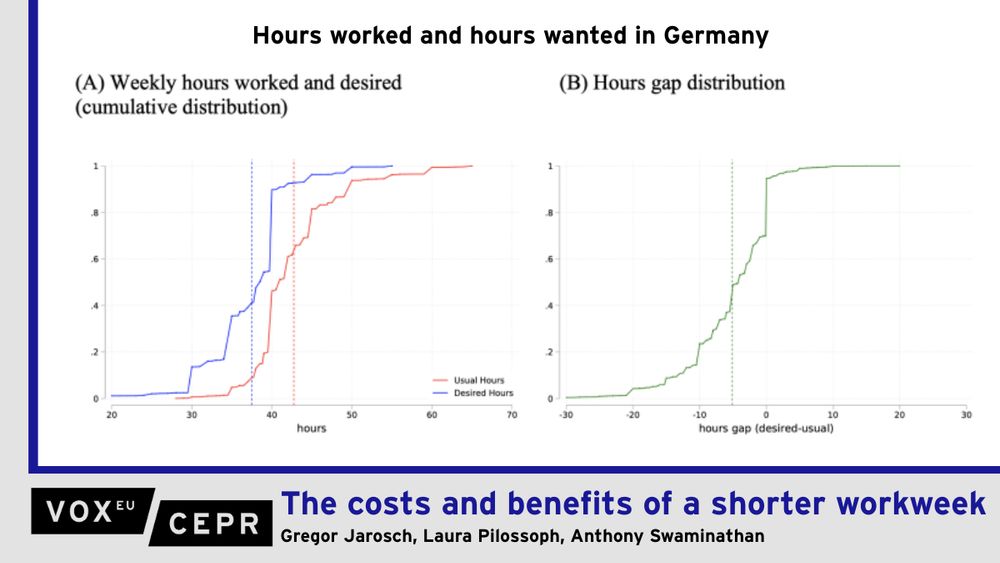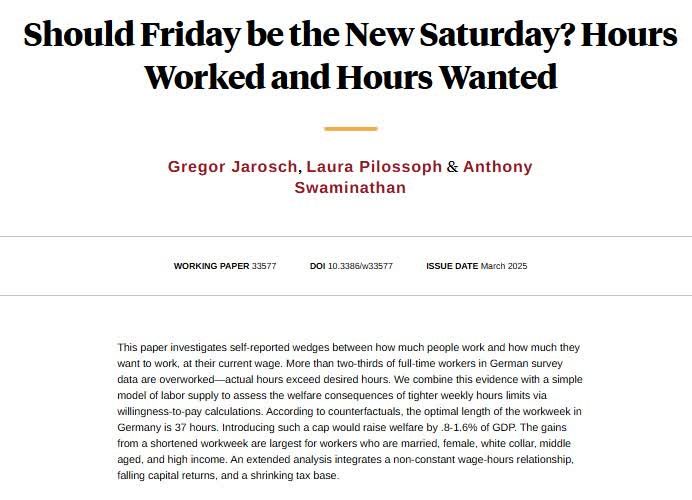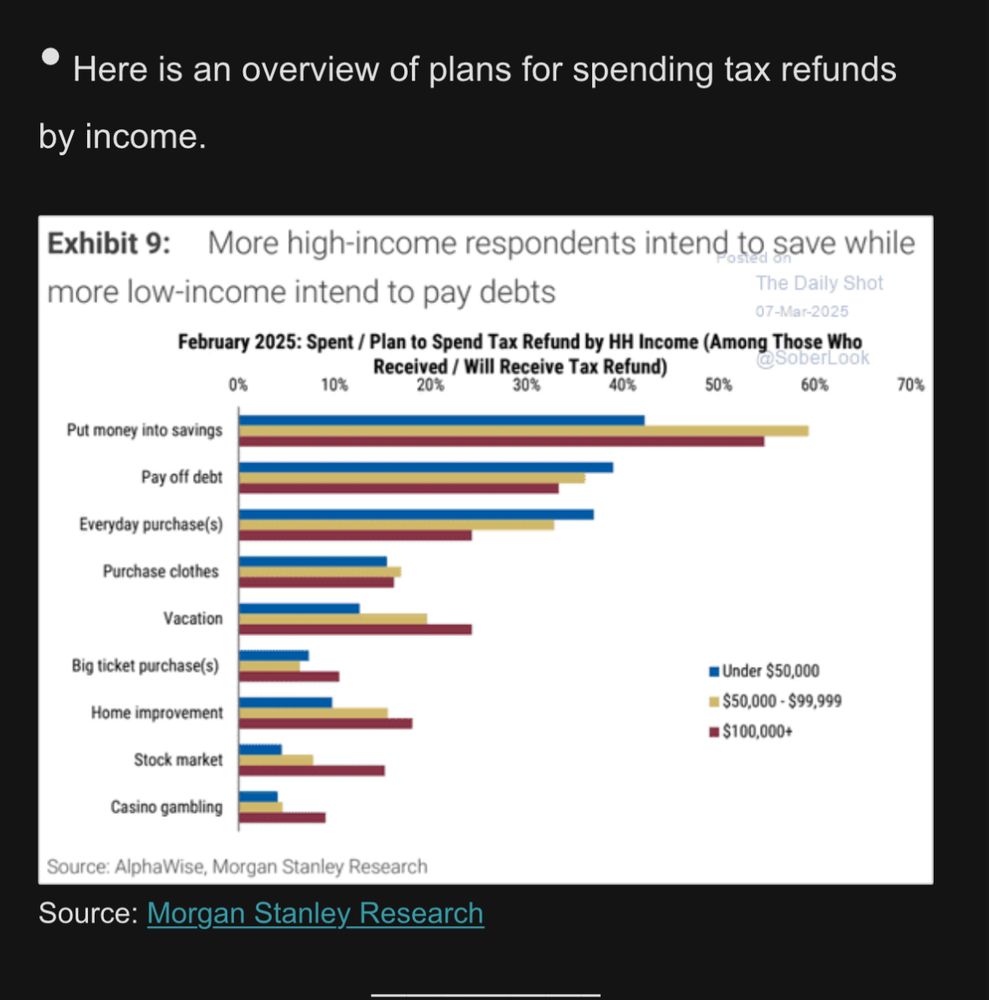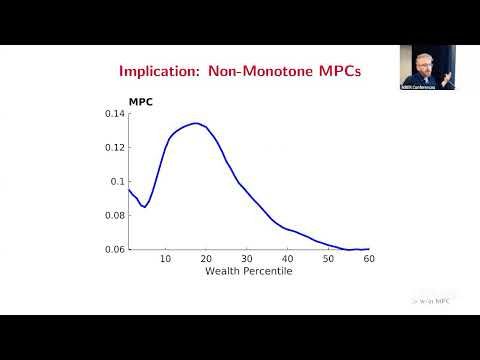
Graphs showing hours worked and hours wanted in Germany.
Policy proposals like the four-day workweek have gained momentum in the aftermath of the Covid recession, raising the question of how many hours people would choose to work. This column uses survey data to establish people’s willingness to pay for additional leisure time in terms of forgone earnings, and vice versa. The findings suggest that many workers in Germany and the UK would happily pay for more leisure and that, thanks to productivity gains, tighter hours caps might bring net positive welfare effects even after accounting for a smaller tax base and reduced capital returns.
Gregor Jarosch, Laura Pilossoph, & Anthony Swaminathan find many workers in Germany & the UK would happily pay for more leisure and tighter hours caps might bring net positive welfare effects even after accounting for a smaller tax base and reduced capital returns.
cepr.org/voxeu/column...
#EconSky
18.07.2025 08:16 — 👍 3 🔁 2 💬 0 📌 1
YouTube video by NBER
Micro Data and Macro Models
Youtube recording of my NBeR presentation here (2:16):
www.youtube.com/watch?v=H209...
18.07.2025 14:18 — 👍 0 🔁 0 💬 0 📌 0

Using survey data from Germany combined with an 'what is the optimal length of the workweek' model suggests 37 hours, from Gregor Jarosch, Laura Pilossoph, and Anthony Swaminathan https://www.nber.org/papers/w33577
22.03.2025 15:00 — 👍 14 🔁 5 💬 0 📌 1

@thedailyshot.bsky.social
07.03.2025 14:15 — 👍 2 🔁 0 💬 1 📌 0
Canadian-British hybrid. Associate Professor at UCL Economics. Metrics, macro, and football
Economist, associate prof at University of Melbourne, studying development, health, mental health, norms, culture, gender
https://sites.google.com/site/victoriabaranov/home
Econ prof University of Zurich.
Faculty affiliate at JPAL, CEPR, CESifo.
Board member IIPF, Helvetas, GAIN.
#EconSky
Sir John Hicks Professor of Economics, LSE. Macroeconomics with distribution(s). https://benjaminmoll.com/
Columbia Business School Professor. Works on the data economy, macro and finance. Finally moving my comments to somewhere more civilized.
Economist. Section chief, Banking and Financial Analysis, Monetary Affairs, Federal Reserve Board. Views are my own, not those of the Federal Reserve System.
Economics professor at UC Berkeley.
https://eml.berkeley.edu/~jsteinsson/
Financial economist at Duke. Basketball enthusiast.
professor, economist, Western Michigan University. First-gen college student. Cornell alum
Associate Professor of Public Policy, Politics, and Education @UVA.
I share social science.
Ricardo Professor of Political Economy, @EconUCL http://ucl.ac.uk/~uctp39a/
Co-Director ESRC Research Centre, @TheIFS http://ifs.org.uk/inequality/
Chicago diehard. President & CEO of the Chicago Fed, econ prof Chicago Booth School, former Chairman of the Council of Economic Advisers.
I do not speak for the Fed or others on the FOMC
macro, fiscal, Fed. creator of the Sahm rule recession indicator. Stay-At-Home Macro (SAHM) Substack.
Professor of Economics at UC Irvine. Co-editor at Labour Economics. Love to rock climb.
https://sites.google.com/view/bhash/home
Chief Economics Correspondent for The New York Times. Adjunct at CUNY Newmark. Ex: FiveThirtyEight, WSJ. He/him.
Email: ben.casselman@nytimes.com
Signal: @bencasselman.96
📸: Earl Wilson/NYT
Associate Professor (lektor), Center for Economic Behavior and Inequality (CEBI), Department of Economics, University of Copenhagen.
https://sites.google.com/view/jeppe-druedahl/
Economist at Philly Fed
www.benjaminrlester.com
Assistant Professor, VU Amsterdam
Associate Professor at UCL Economics. Research on college access, information frictions, peer effects. Affiliations: IFS, CEPR, LEAP, CESifo, HCEO.
From Lake Maggiore to London via Philly.
https://sites.google.com/site/mtincani
Econ, ECB, Bundesbank, georgikocharkov.de. My personal opinions do not necessarily reflect the views of my employers.



